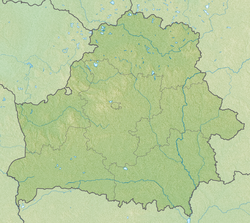Great Synagogue (Grodno)
This article needs additional citations for verification. (July 2013) |
| Great Synagogue of Grodno | |
|---|---|
Belarusian: Харальная сінагога, Горадня | |
 The synagogue, in 2019 | |
| Religion | |
| Affiliation | Orthodox Judaism |
| Rite | Hasidic Judaism |
| Ecclesiastical or organisational status | Synagogue |
| Status | Active |
| Location | |
| Location | Vialikaja Trajeckaja Street 59a, Grodno 230023 |
| Country | Belarus |
Location in Belarus | |
| Geographic coordinates | 53°40′43″N 23°49′29″E / 53.6786°N 23.8246°E |
| Architecture | |
| Architect(s) | Iya Frunkin |
| Type | Synagogue architecture |
| Style | |
| Date established | 1576 (as a congregation) |
| Completed | 1905 |
| Website | |
| jewishgrodno | |
The Great Synagogue of Grodno (Belarusian: Харальная сінагога, Горадня, Russian: Большая Хоральная синагога, Гродно), also known as the New Synagogue or the Choral Synagogue, is an Orthodox Hasidic Jewish synagogue, located on Vialikaja Trajeckaja Street, in Grodno (or Hrodna), Belarus. The building dates from the 16th century and was nominated for UNESCO World Heritage listing in 2007.[1][2][3]
History[edit]
The Great Synagogue of Grodno was built from 1576 to 1580 by Santi Gucci, who designed a wooden synagogue at Rabbi Mordechai Yoffe's invitation. However, this building burnt down in 1617.[4]
In 1887, the Grodno Jews owned 88% of the commercial enterprises, 76% of the factories and workshops, and over 65% of the real estate in the city. Their property was estimated at 842,000 roubles at a time when the total sum of the city's properties was 1,202,000 roubles. In 1898, one of the first savings and loan cooperatives in Russia was founded in Grodno.
The second synagogue was also burnt down in 1899.[4]
Under the supervision of Iya Frunkin, the Jewish community built another synagogue in the eclectic and Moorish style from 1902 to 1905. By 1907, the city boasted a state Jewish school, a girls' school, a craft shelter, a Talmud-Yeshiva, 107 Jewish primary schools, and 5 elementary schools for girls. This was unique in Russia.
There were also two Jewish libraries and several Jewish charitable organizations working in the city.
Jews played a very significant role in city life as industrialists, merchants, craftsmen, owners of printing houses, doctors, and teachers. There was said to be a special "Grodno Aura," created by its cultured and intelligent population. For this reason Grodno was considered to be one of the Jewish intellectual capitals of Europe.
The interior of the synagogue was vandalized in 1941 by Nazis. Soviet authorities closed the synagogue in 1944. The synagogue was returned to the Jewish community in 1991; and was subsequently restored[4][5] under the direction of Rabbi Yitzchok Kofman. However, in 2013, the synagogue was again destroyed by fire.[6][7] The synagogue has since been restored and is in use.
Notable members[edit]
- Léon Bakst, an artist
- Ilya Gintsburg, a sculptor
- L. L. Zamenhof, the founder of Esperanto
- Herman Yablokoff (born Chaim Yablonik), the composer of Papirossen
- Avram-Shalom Friedberg (Авроом-Шолом Фридберг), a Hebrew translator
Gallery[edit]
References[edit]
- ^ "Иудейская религиозная община г. Гродно]" (in Belarusian).[verification needed]
- ^ "Great Synagogue of Grodno". Vetliva. Retrieved 16 April 2024.
- ^ "The Great Synagogue of Grodno (also known as the "New" or "Choral" Synagogue)". Wirtualny Sztetl. Retrieved 16 April 2024.
- ^ a b c "The Great Synagogue of Grodno (also known as the "New" or "Choral" Synagogue". Virtual Shtetl. Warsaw, Poland: POLIN Museum of the History of Polish Jews. n.d. Retrieved 23 March 2024.
- ^ "Great Choral Synagogue Grodno". The Sane Travel. 2023. Retrieved 23 March 2024.
- ^ Margolin, Dovid (15 January 2014). "Grodno's Great Synagogue Again to Rebuild From the Ashes". Chabad News. Retrieved 23 March 2024.
- ^ "Fire ravages Belarus' oldest functioning synagogue". The Times of Israel. 29 November 2013. Retrieved 23 March 2024 – via Jewish Telegraph Agency.
External links[edit]
- 1576 establishments in Belarus
- 20th-century synagogues in Europe
- 20th-century attacks on synagogues and Jewish communal organizations
- Attacks on religious buildings and structures during World War II
- Building and structure fires in Europe
- Buildings and structures in Grodno Region
- Gothic Revival architecture in Belarus
- Gothic Revival synagogues
- Hasidic synagogues
- Jewish organizations established in 1576
- Jews and Judaism in Grodno
- Moorish Revival architecture in Belarus
- Moorish Revival synagogues
- Orthodox Judaism in Belarus
- Orthodox synagogues
- Synagogues completed in 1905
- Synagogues in Belarus









